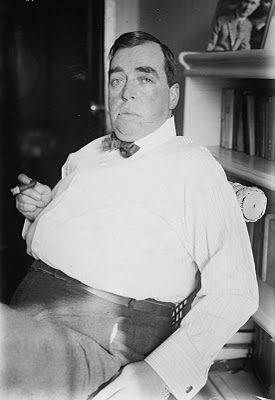
I’ve written before about John Ford’s amazing 1953 movie The Sun Shines Bright, and have been showing that movie to people since the late 1970s. It’s not on DVD but a nice VHS copy does exist.
You can, however, order a DVD copy of Ford’s earlier Judge Priest, starring Will Rogers; as well as Ford’s Steamboat Round the Bend
, which not only stars Will Rogers but features a certain power behind the throne: the popular writer Irvin S. Cobb.
Irvin S. Cobb (1876-1944) was a writer of short stories, chiefly for “The Saturday Evening Post”. He reigned supreme in the magazine business from the years immediately following World War I through the Great Depression. His popularity began to wane at the end of the 1930s, and by the time Cobb died, during the Second World War, he had become a kind of ‘relic’ of Old South anecdote and sentimentalism.
That did not prevent him from being John Ford’s inspiration for Ford’s personal favorite, The Sun Shines Bright, which was produced eight years after Cobb died. Nor did it prevent Cobb’s stories from being anthologized through the present day, such as “Fishhead”, a Lovecraftian horror tale, and “Faith, Hope, and Charity”, a cannily told tale with the moral ‘crime doesn’t pay’.
But for the readers of Mockingbird, however, Cobb offers a brilliant lesson and a poignant teaching. His stories, in particular the “Judge Priest” sequence, are permeated with Grace.
 In these stories, Judge Priest, who was actually based on a man Cobb know during his childhood in Paducah, Kentucky, is the wily and delightful dispenser of Grace in a small Southern town towards the end of Reconstruction. The Honorable William Pittman Priest carries the Christian light for the town of Fairfield, Kentucky. When churches, pastors, and pharisees fail to forgive or give mercy, Judge Priest is there to dispense the same. When local mores and judgments stand in the way of compassion, Judge Priest is there to intervene and ‘do it himself’. He inspires the town, takes away its pretenses, and suffers, too, for reward, the vindictiveness of the town. In most cases, Judge Priest triumphs.
In these stories, Judge Priest, who was actually based on a man Cobb know during his childhood in Paducah, Kentucky, is the wily and delightful dispenser of Grace in a small Southern town towards the end of Reconstruction. The Honorable William Pittman Priest carries the Christian light for the town of Fairfield, Kentucky. When churches, pastors, and pharisees fail to forgive or give mercy, Judge Priest is there to dispense the same. When local mores and judgments stand in the way of compassion, Judge Priest is there to intervene and ‘do it himself’. He inspires the town, takes away its pretenses, and suffers, too, for reward, the vindictiveness of the town. In most cases, Judge Priest triumphs.
No more memorably does ‘Billy Priest’ overcome the Law, though he is the sitting Judge in Fairfield County, than in the short story, published in 1916, entitled “The Lord Provides”. In this story, which also provides the climax for Ford’s 1953 movie, the Judge must decide whether or not he will preside at the funeral of young prostitute and, if he does so, lose an election. He takes action in what becomes a very public sort of liturgy. What he actually does, and the reaction it provokes, needs to be seen to be believed.
Thursday’s episode of PZ’s Podcast tells the story of this forgotten yet wonderful Kentucky writer Irvin Shrewsbury Cobb. Interestingly, for me, I am going to Paducah in two weeks, to make a pilgrimage to the place where John Ford first stopped, when he arrived in that town in 1961 to film “The Civil War” segment of How the West Was Won: Cobb’s grave.

COMMENTS
Leave a Reply













